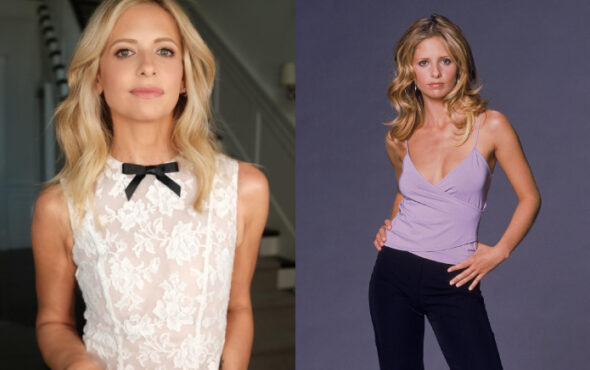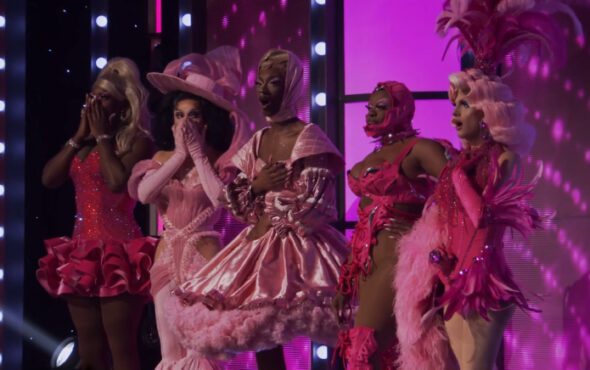
Killing Eve, once again, reminded us that the gays, gals and non-binary pals can never get emotionally attached to a character. In fact, Carolyn Martens, Eve’s associate of sorts, offers a lukewarm token of advice mid finale. “Emotions, or feelings as people apparently like to call them nowadays, are at best an inconvenience,” she warns. “Don’t let them take hold.” It’s an interesting string of dialogue for season four showrunner Laura Neal to slot in a couple of scenes before Killing Eve’s aspirational penultimate twist. So, before we go ahead, here’s our warning that this feature will be spoiler-heavy.
Truthfully, Killing Eve has been winding down a car crash route for quite some time. Based on the books written by Luke Jennings, the thriller series was once loaded with fruitfully mischievous tales and murders. But, soon enough, the show began to fade under the shadow of what it could have been. The first season of the BBC spy drama was unquestionably captivating. Penned by British writer Phoebe Waller-Bridge, it was unafraid of reimagining the lives of two deeply complicated characters and their mutual messy, dark, obsession with one another. Sandra Oh effortlessly portrayed an MI5 agent (Eve) seeking something more than her restrictive desk job, while newcomer Jodie Comer (Villanelle) brought a charmingly nihilistic assassin to life. Together, on-screen, the duo daringly waltzed back and forth as they chased one another through exquisite deaths (my favourite is the brilliantly squeamish poisoned hairpin to the eye). But, after time, this yin and yang dynamic could only go so far before retracing old steps.
It wasn’t a surprise that season two would need to be inventive in its new direction. After all, Waller-Bridge had closed off a spectacular season with a cliffhanger that left all viewers wanting to know what happened next. Viewers got tiresome as the second phase of the spy show, some even going as far as labelling the hit drama as queerbaiting. Some misplaced comments by co-lead actor Sandra Oh, who claimed a romance between Eve and Villanelle was not integral to the show, stoked the fire. But, at the heart of it, queer viewers had journeyed through numerous episodes to have their expectations pan out to nothing more than sexually charged scenes thriving off contextual substance, rather than something more urgent.
As the final season rolls around, it’s clear that Eve and Villanelle needed to spend time apart. In doing so, their reunion was supposed to be climactic, a super-charged return back to one another. Yes, they were changed, but their reconciliation was long-awaited. Posts, tweets, and carousels of images by LGBTQ+ viewers flooded social media upon season four’s return. But as haphazard writing brought us to the end, the two-part finale of Killing Eve began to bow under its weight. The question of the mighty Twelve was clumsily addressed in an off-screen killing spree, at the hands of Villanelle, with little to no clarity of who made up the illusive faceless overlords. And then it happened. The ‘Bury You Gays’ trope lurked behind our beloved protagonists. At this point, Eve and Villanelle were on the same side.
In earlier scenes, they shared urgent kisses, embraced and relaxed into their time together. It was warm, welcoming and an overdue tone change for the pair. A pleasant ending is how the books wrap up too. “I did it, Eve,” Villanelle proudly declares, hugging Eve, who replies emphasising that they both did it. It was summative of their time together before it all unravelled. You can imagine my confusion when the scene suddenly cut to Eve’s horrified face as blood began to pour from the assassin’s chest. It was happening, again. Another LGBTQ+ character, a female character, was going to meet the grave.
We’re all, unfortunately, well acquainted with the ‘Bury Your Gays’ trope, but for some reason, I hadn’t expected it to pan out like this. Deaths happen in TV shows and movies, it’s a given. They’re some of the most commonly utilised plot tools at hand, but the betrayal, for me, lies in the fact it was unnecessary. Much like the books, the on-screen lovers could have retired with a peaceful ending. Surely, they had endured enough resistance and violence for a lifetime. But this ending didn’t serve a plot purpose. The death of Dani Clayton (The Haunting of Bly Manor) was tragic but it closed off an impactful emotional ending that left us all in our feelings. The death of Villanelle felt like a desperate reach for shock factor. It wasn’t needed and, to add insult to injury, it wasn’t well done.
In what came across as a Titanic-style ending with the assassin, who was left bleeding out and floating away, it was rushed. Equally, the death of Villanelle had no unity with the show’s title: Killing Eve. What did this mean for its leading character? Much like the gunshot killing of Lexa (Alycia Debnam-Carey) in The 100, it was a reminder that queer characters come across disposable impact moments. Let’s not forget the similar OG of Tara from Buffy The Vampire Slayer either.
Killing Eve emerged as a show that would seemingly honour queerness, the nuance of female relationships and the want for a gripping drama. LGBTQ+ viewers found solace in a modern show that put a dramatic queer female duo front and centre. But, at the end of it, Killing Eve traded in its complex characters for an anti-climatic ending. So much so, you can imagine an underwhelmed Villanelle, impatiently watching her own death yelling: “This is boring!”



